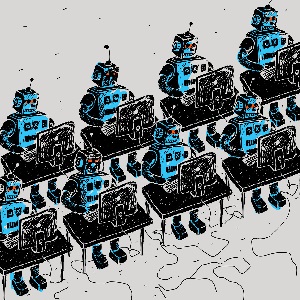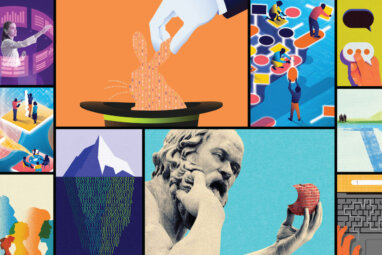How Will Cognitive Technologies Affect Your Organization?
Our once-subservient machines are encroaching on tasks that have been firmly in the human domain.
Topics
Competing With Data & Analytics
Even seasoned carnival barkers might struggle to exaggerate the current feats of cognitive technologies. We now marvel at artificial intelligence-fueled creations that allow a teenager to win 160,000 parking ticket cases or an app to quickly diagnose health symptoms at a fraction of the cost of a doctor alone. The accomplishments are inspiring.
Unless, of course, you manage a law firm or medical practice now in the position of competing against these machines.
Cognitive technologies are artificial intelligence-based systems that increasingly do tasks that once required humans. We’ve seen rapid progress in these technologies in the past decade as processing power, machine learning techniques, and data collection combine for marvelous results. Extreme inventions, once concocted to make science fiction appear futuristic (such as real-time language translation) are now miraculously close. Our once-subservient machines are clearly encroaching on many tasks that were firmly in the human domain not very long ago.
When cognitive technologies increase proficiency at knowledge worker tasks, they will likely bring:
- Decreases in costs, as organization replace human labor with technologies that don’t require salaries, health insurance, etc.;
- Improvements in organizational performance, as machines operate tirelessly at a pace that humans can’t;
- Easy scaling, as organizations replicate algorithms and machines to meet demand in ways that don’t require recruiting, interviews, and relocation;
- Reductions in variation as calibrated algorithms always produce the same output for the same inputs.
As cognitive technologies develop, what can organizations expect?
Reduced variation between organizations. In the most basic production function, organizations use processes to transform two components, labor and capital, into output. With technology progressively commoditized, labor — particularly technology-savvy labor — has become an important way for organizations to differentiate themselves from their competitors. This technology savvy talent has been difficult to get and, due to scarcity, a source of distinction and potential advantage. But cognitive technologies are explicit and codified in algorithms. As a result, labor will be increasingly governed not by the laws of atoms, but instead by the laws of bits. This shift in allegiance will bring both benefits (e.g., scale, low variable costs, replication) but also difficulties (e.g., theft, copyright infringement, obfuscation, complexity) typically associated with digital goods. Once digitized, skills currently embedded in labor can be duplicated and transferred. Like other non-exclusive information goods, they can be sold and used by multiple organizations at the same time.






Comments (2)
ext.rupeshgaikwad
Mihai Fox